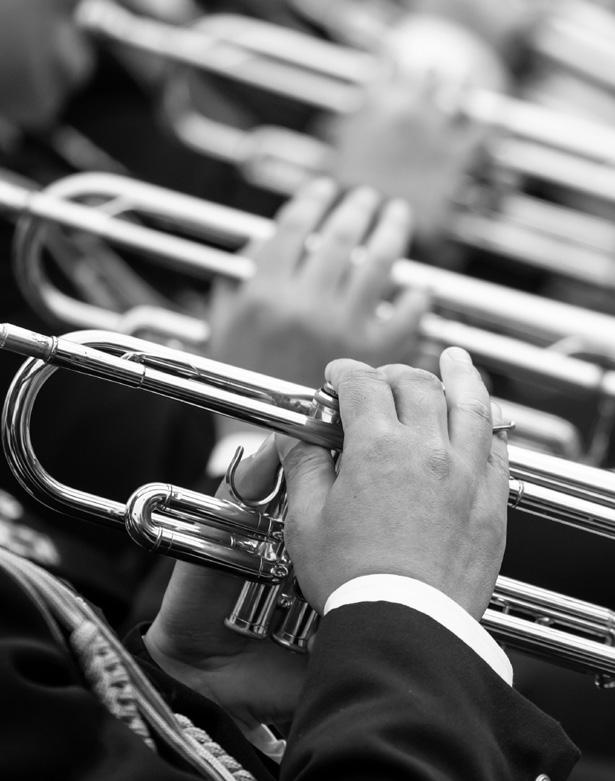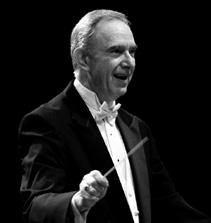
7 minute read
Revelli Composition Contest — Matthew McCutchen
FRANK TICHELI’S LUX PERPETUA WINS THE 2021 NBA/WILLIAM D. REVELLI MEMORIAL BAND COMPOSITION CONTEST
BY MATTHEW MCCUTCHEN
As our profession continues to recuperate from the damage done by the Coronavirus pandemic it was exciting to receive 46 excellent entries into this year’s William D. Revelli
Composition Contest. These included submissions ranging from promising middle school students to those from some of the best-known and most widely performed composers in the profession. It gives me great pleasure to announce Lux Perpetua by Frank Ticheli as the winning selection of the forty-fifth annual contest.
Dr. Ticheli likely needs no introduction to the readers of this journal, and he is certainly no stranger to this competition having won it in 2006 with his Symphony No. 2. He is well-known for his works for concert band, many of which have become standards in the repertoire. In addition to composing, Ticheli guest conducts his music regularly at American universities and music festivals and in cities throughout the world. Ticheli was awarded national honorary membership to Phi Mu Alpha Sinfonia, “bestowed to individuals who have significantly contributed to the cause of music in America,” and the
A. Austin Harding Award by the American School Band Directors Association, “given to individuals who have made exceptional contributions to the school band movement in America.” He serves as Professor of Composition at the University of Southern California, where he has received the Virginia Ramo Award for
NBA/William D. Revelli Memorial Band Composition Contest, Matt McCutchen, cont.
excellence in teaching, and the Dean’s Award for Professional Achievement.
Lux Perpetua is a stunning work that was composed for the Baylor University Wind Ensemble in memory of two young clarinetists, Laura Onwudinanti and Jack Stewart, who lost their lives in an automobile accident in 2014.
Ticheli writes:
“The idea of light as both protector and illuminator was constantly in my mind as I composed the piece. Two kinds of light comprise the work: one soft and meditative, the other more sparkling and effervescent.
The work’s title is drawn from the last line of the Latin text, Lux aeterna: “et lux perpetua luceat eis” (and let perpetual light shine). The idea of light as both protector and illuminator was constantly in my mind as I composed the piece. Two kinds of light comprise the work: one soft and meditative, the other more sparkling and effervescent. Also in mind were the respective personality traits of the two dedicates, Jack being more thoughtful and introspective, Laura being more spontaneous and gregarious.
A simple call motive begins the piece, introduced by the clarinets. Its two main notes form a descending minor 3rd, a sound that is universally associated with a call or greeting. This idea is laced into the entire fabric of the piece, sometimes serving as transition material, other times appearing unexpectedly for purposes of contrast, still other times flowering into the main melody.
The main melody is at once longing and noble in quality and is constructed in a way that suggests the notion of infinity. Its accompanying harmony depicts a kind of bellows or the act of breathing, in and out perpetually. It never settles on a final chord, but instead moves to a builtin modulation, compelling the melody to repeat itself in a chain of new keys.
A faster, more energetic middle section serves as a dramatic contrast, but rather than give it a new theme, I chose to continue with a variant of the main melody. The accompanying harmony is still breathing, the lyrical line still permeating the entire section, but this time building to a tremendous climax. The final coda is a brief meditation. The main melody echoes itself tenderly as the harmony begins its slow and fragile ascent to the heavens.”
Lux Perpetua is scored for standard wind band instrumentation plus harp, which is often, but not always, doubled in other voices. Five percussionists are required to cover the parts, and as with most of Ticheli’s music, their input is crucial to the success of the piece. The work is in ABA form with few technical challenges at the beginning and end (with the exception of a tricky 5-measure passage in alto saxophone and trumpet), but several in the middle. It will be imperative that ensembles who perform this piece have students with a strong sense of pulse and a death-grip on myriad ways to perform 16th notes. There are few range concerns, although the bari-sax does get to go up to registers they might not be used to exploring. There are short, poignant solos in piccolo, flute, clarinet, alto saxophone, trumpet, and horn.
The members of the Revelli Committee have made a concerted effort in recent years to select pieces that are accessible to a large number of ensembles throughout the country. While this piece certainly requires mature players, the technical aspects are within the range of many high musicians.
Lux Perpetua was premiered by the Baylor Wind Ensemble at the TMEA Conference on February 13, 2020 shortly before the world shut down for Covid.

Matthew McCutchen is the Director of Bands at the University of South Florida. He is also the founder and conductor of the Bay Area Youth (BAY) Winds and the Artistic Director and Conductor of the Florida Wind Band. He is the chair of the National Band Association’s William D. Revelli Band Composition Contest, and is on the John Philip Sousa Foundation Legion of Honor Selection Committee.
NBA/William D. Revelli Memorial Band Composition Contest, Matt McCutchen,cont.
LINDSAY BRONNENKANT
The initial performance can be seen on Youtube by searching “Ticheli: Lux Perpetua | Baylor University Wind Ensemble | TMEA 2020.” It is available for purchase from Manhattan Beach Music. Ensembles that program the work will be profoundly rewarded.
In addition, for the first time in recent memory the Revelli Selection Committee requested that a first runner-up be named. Tarot by Lindsay Bronnenkant is a fresh and exciting work by a young and upcoming composer who clearly has a brilliant future ahead.
Bronnenkant is a DMA student at the Eastman School of Music where she is working on a degree in Wind Conducting. She additionally serves on the faculties at Nazareth College and Hobart and William Smith Colleges. Prior to graduate studies at Eastman and the University of Michigan, she taught and led several ensembles in the Rochester, NY area.
Tarot is her first published work for wind band, and of it she writes:
“Gustav Holst was incredibly interested in Indian culture, going so far as to teach himself Sanskrit. Some evidence suggests that he tried to incorporate Indian rāgas into his works, and after investigating Holst’s resources and analyzing his Planets, I believe that Holst tried to reference rāgas that evoked similar characters to those of the planets in his suite. However, whether because of his limited access to authentic performance of Indian music, his experiences with modal composition during the British folksong revival of the early 20th century, or by suggestion from Indian music expert Maud MacCarthy, Holst used the pitches of rāgas using western theoretical practices, treating what were once rāgas as scales or modes.
I decided to compose a suite that traces Holst’s footsteps but applies his musical experimentation to a new topic: Tarot. Like astrology, Tarot cards have been used for divination, and as each planet in modern astrology represents specific characteristics and personality traits, so too does each Tarot card.”
The suite portrays three Tarot cards: the Fool, the King of Cups, and the Tower. Tarot was composed for a restricted number of players at the Eastman School of Music during the Covid-19 pandemic. The numerous challenges – extended technique and range in several instruments, advanced percussion, keyboard, and harp requirements, etc - puts it out of the range of many ensembles. However, even if this is a piece beyond your ensemble's capabilities it is one that belongs in your listening library. The writing is fresh and inventive, the colors are captivating, and this is a composer we hope to hear much more from in the future. Tarot is available for purchase through Murphy Music Press.
The remaining finalists for the 2021 contest are listed below. Each of these are outstanding pieces which are well-deserving of many performances and academic study.
Concerto for Wind Ensemble –Kevin Day
March! –Jennifer Jolley
Some treasures are heavy with human tears –John Mackey
Transcending –Christopher Marshall
I believe that what the committee accomplished this year – selecting a piece by one of our profession’s best known and most highly touted composers, and one by a young composer who seems to be poised to be an important voice, is exactly what John Paynter and Al Wright would have loved to see happen when they started the contest 45 years ago.










